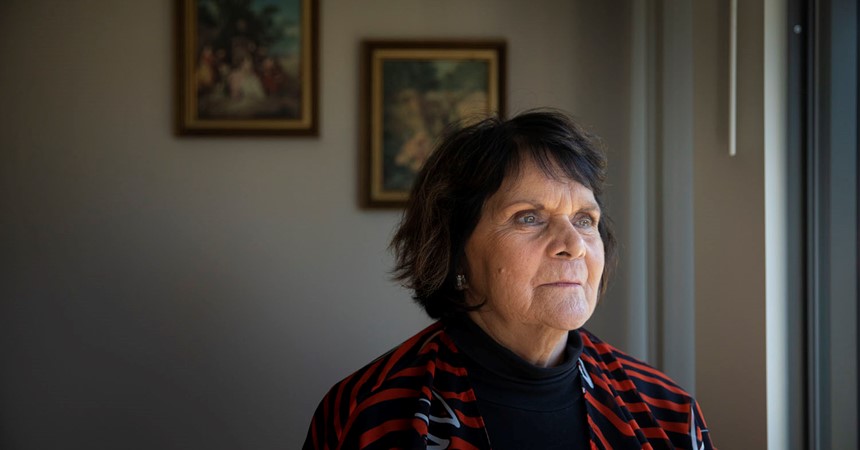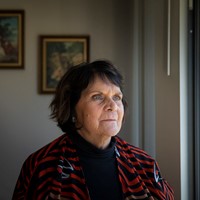I understand the discontent around the world because we all have so much in common. We share a deeply fraught history of white supremacy, so we are all asking to stand as one human family, creations of God, regardless of our age, infirmity, creed or colour. We need to focus together in laying the foundations of trust and try to create a better future. We must try to provide opportunities to incorporate the stories, hopes and dreams of all so that our people too, can be empowered and take a rightful place in their own country. So in that spirit I’d like to share with you my own personal story in the hope it may help the vital process of reconciliation.
One of the darkest chapters of Australian history was the forced removal of Aboriginal children from their families. Children as young as 6 month old babies were stolen from their families to be placed in girls and boys homes or with foster families.
These aboriginal people are now collectively referred to as the 'Stolen Generation’ because several generations were affected by this process which commenced in the 1890s and continued till as late as the 1970s. Many Aboriginal people are still searching for their families, but sadly due to the passing of time and the deaths of family members, some Aboriginal people may never find their relatives.
In removing Aboriginal children from their families, white people stole the Aboriginal people's language, traditions, knowledge, dances, spirituality and importantly their future because all of these things can only live on if passed down through the children. In breaking this circle of life, white people’s hope was that within a short period of time they would 'get rid’ of the Aboriginal problem. The forced removal of Aboriginal children from their families was official government policy for over 100 years and, in fact, not only did Governments play a major role, but churches and welfare bodies as well all took part in this systematic destruction to breed out indigenous people.
Today, as a member of the stolen generation I would like to share with you the real face of this part of our history. It will probably surprise you to hear that I had to wait 56 years to discover my story, the story of being stolen from my parents and my brothers and sisters who lived peacefully on a Mission at Karuah.
In the later part of 2010, when my husband retired he applied for his birth certificate in order to finalise some financial matters and I decided that I would apply for mine as well. When the certificates arrived, I noticed that they were quite different. My birth certificate was signed by the Register General on the 8 August 1960, yet I knew I was born on the 15 August 1955. I was perplexed as to why this was different and after speaking with a friend wondered if I may have been adopted. We did some research and I contacted Human Services. About 6 weeks later I received a letter confirming that I had been adopted and that I was part of the Stolen Generation and that I had siblings. You can perhaps imagine my shock - I had lived for 56 years as part of a white, middle class family in a country town, totally disconnected from my Aboriginal heartland - the Woromi people.
As the story unfolded I discovered that in 1956 I and my two sisters Jennifer and Betty and my brother Peter had been taken away from our mother while our father was away working. I was about 12 months old. There was about 12 months between us all - Betty around 2 years old, Peter was about 4 years old and Jennifer was about 5 years old. We were very quickly declared Wards of the State. Research shows that there was no reason for us to be taken, we were not at risk but the perception was that Aboriginal people could not correctly care for or raise their children.
My sisters and I were placed in a home for children - the Georgetown Shelter in Newcastle. As Wards of the State we were now under the guardianship of the Minister for Child Welfare and this meant we could be sent anywhere the government decided. As siblings we were split up and we never saw each other again. I was sent to Corelli, a government run home in Marrickville in Sydney. I stayed there until 1957 when I was fostered by a young couple from Kurri Kurri, Des & Patsy Williams. I was two years old. In 1960 the Williams' officially adopted me. In terms of the adoption, I was lucky because not only did they give me a very good life, they loved me. My foster parents gave me a good education and encouraged me to pursue my love of music, resulting in my classical training in piano and to this day my work with the Conservatorium is a blessing in my life.
Personally, though, I have had to come to terms with many complexities in relation to my stolen life. I have experienced the heartache of not only finding out that I had a different identity to what I had always believed, but that I had siblings who lived within two hours' drive of my home. I have had to come to terms with the fact that because Des and Patsy never told me that I was adopted, I never had the opportunity to find my parents or two sisters and brother, for by the time I found out about being stolen they had died.
Despite this great sadness, I made a choice at that point to become part of the Government's Open Register which meant that agencies could match me up with any person or relative who may have been looking for me and facilitate a meeting. About 4 weeks after placing my name on the Open Register I received a phone call to say, 'I have the most beautiful news for you - we think we have found your youngest sister'. That day the agency told me they would organise a phone call between me and Margo. I was stunned and even more so when I found out that Margo lived in Raymond Terrace, we could have been passing one another in a shopping centre and not even have known one another. I nervously waited for the call and had all sorts of thoughts chasing around in my head - how would I feel when we spoke, what would she be like, would she look like me? A couple of days later Margo drove to Kurri, that moment of recognition is blurred by memories of tears and hugs. Finally after 56 years I had found part of my stolen family!
Finding Margo was the first step in my journey back to my identity. Through Margo I found and met cousins, aunts and uncles. I have been introduced to my country in Karuah; I have been able to go back to the Mission where it all began, I have been able to learn some of the story of my parents and importantly I have been able to learn about and reconnect with my people and culture. I continue to learn about and understand my identity, and to explore what it means to be an Aboriginal woman. I am learning about the kinship of the Woromi people, the circle of the Land Council and am growing in my understanding of my culture and spirituality.
Working with Aboriginal children and sharing my story is part of my healing process. Talking about what has happened, sharing experiences, meeting relatives, crying and laughing are all part of the journey of healing for the Stolen Generations. All Australians can take part in this journey by listening to the stories of the Stolen Generation and acknowledging this sad event in our history. Our journey towards understanding and reconciliation may not be as long or as hard as the journey of Molly, Gracie and Daisy along the Rabbit Proof Fence, but if we take the first steps to understand what happened to the stolen children we may ensure that the same thing will never happen again.























































































